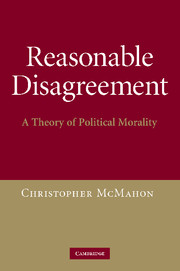2 - Moral nominalism
Published online by Cambridge University Press: 11 September 2009
Summary
At the end of the previous chapter, I argued that standard versions of moral realism cannot provide an adequate account of reasonable moral disagreement. I also noted that standard non-realist views, according to which moral judgments describe or express wants or desires that people simply happen to have, display this defect as well. To accommodate the practicality of moral judgment, however, we need to retain the idea that moral judgments set targets. The task, I concluded, is to explain how target-setting judgments can be understood as well or poorly grounded, and thus as competently or incompetently made, without introducing some kind of perception of objectively existing targets.
Jürgen Habermas has suggested that this goal can be achieved by employing a single notion of well groundedness: validity. An empirical judgment is well grounded when it is supported by adequate evidence. Well-grounded empirical judgments can be regarded as true, where truth is understood as correspondence with independently existing facts. A moral judgment, by contrast, is well grounded when there is sufficient moral reason to perform the action it directs. In this case, Habermas says, validity is to be understood as rightness rather than truth. There are, to be sure, normative facts associated with validity in the moral domain, but these are logical facts, facts to the effect that a certain conclusion is supported by certain reasons. A moral ought-judgment, a judgment that some action morally ought to be performed, can be understood as recording the existence of such a fact.
- Type
- Chapter
- Information
- Reasonable DisagreementA Theory of Political Morality, pp. 34 - 67Publisher: Cambridge University PressPrint publication year: 2009



